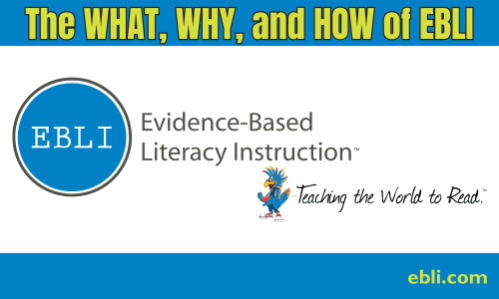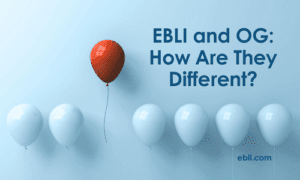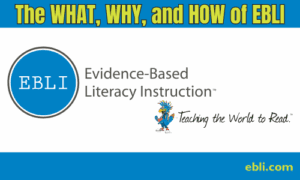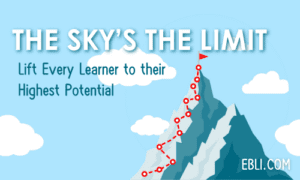“I don’t understand what EBLI is and how it is different.”
Although EBLI has been around for over two decades, there’s been a sharp increase in curiosity and interest in it recently. The foundation of a Linguistic Phonics (LP) / Structured Linguistic Literacy (SLL) / Speech to Print approach utilized in EBLI, as well as the accelerated student literacy outcomes achieved with EBLI instruction, is especially intriguing to many.
People from around the world are eager to learn more about EBLI, and the intention of this blog is to offer information, clarity, and resources for anyone who is EBLI-curious.
Since Linguistic Phonics is an approach, and EBLI is a system that includes skills, concepts, and processes that students continue to use throughout their lives when reading, spelling, and writing, it is markedly different from phonics and reading programs that have a set beginning and end and are designed to teach specific content.
In addition, there is much confusion around the term “Speech to Print,” which is commonly used to describe approaches built on Linguistic Phonics. However, the term is also used to reference encoding, or spelling, and the book Speech to Print authored by Louisa Moats. Add to that the unique and significant differences of how instruction is delivered, and it becomes even more of a challenge to convey clearly the uniqueness of EBLI and what sets it apart.
I first discovered Diane McGuinness, who coined the term Linguistic Phonics, in 1997 through her book Why Our Children Can’t Read. In 2003, I created EBLI.
After nearly 30 years in this work, I’ve found that showing what EBLI is—rather than trying to explain it in words (which never quite does it justice) – is what works best!
The series of videos below is intended to be a ‘one stop resource’ and ‘show AND tell’ for those who are EBLI curious. They will walk you through the history, what, why, and how of EBLI.
Videos are presented in the order of recommended viewing.
Descriptions and resources, when applicable, are included above each video.
Shifting Paradigms: Merging the Science of Reading with the Science of Learning
This presentation was developed through the collaboration of Linguistic Phonics (LP) practitioners and LP program creators. Whether you’re a classroom teacher, reading specialist, parent, private practitioner, community member, or administrator, it will provide an understanding of the framework, effectiveness, and efficiency of Linguistic Phonics.
Topics include:
- Speech-to-print orientation (Linguistic Phonics)
- Integration of phonemic awareness, phonics, reading, and writing
- Complex code taught earlier (and why it matters)
- Minimizing rules, maximizing patterns and procedural knowledge
- Real-time, responsive feedback to accelerate growth
- Outcome data and peer reviewed research
RESOURCES [LINK]: Research, Outcome Data, Sources, Articles, Blogs, Webinars
Dyslexia Explored: Other Ways to Teach Reading with Nora Chahbazi
This podcast is the most watched recording ever about EBLI and instigated a flood of interest in EBLI from around the world. It was the most enjoyable interview I’ve ever done because it was organic and authentic, with an impromptu EBLI lesson thrown in the middle of it! Darius Namdaran and I were introduced by Viki Stein, an EBLI teacher who rewired her own brain just by TEACHING EBLI.
All About EBLI
In this video, I share the ‘what, how, and why of EBLI’ as well as the history of how it came to be. There are images of various EBLI activities and an explanation about what they teach as well as student outcome data from a variety of assessment data from schools and organizations for over 2000 K-12 students.
Overview of EBLI with Students
These videos showing the progression of EBLI activities and flow of instruction are included in ETSL, EBLI’s Teacher Training and Student Lessons. They give you a ‘taste of EBLI’ and the integrated instruction that builds as students become more proficient at incorporating the EBLI processes.
Whole Class Instruction: Kindergarten
Intervention, Tracks 2 & 3: 2nd – 12th grade
To ask questions and interact with educators and others who are EBLI curious or EBLI trained, the EBLI Community is a welcoming Facebook group with a wealth of information. The EBLI Blog and FREE webinars are valuable sources to utilize to learn more about specific EBLI-related topics.
Your interest in exploring EBLI is greatly appreciated! Our collaborative mission to teach the world to read is a lofty one, but can be accomplished with the ever-expanding legion of literacy champions like you joining forces together for the best and highest good of learners!
“The wonderful thing about EBLI is that it is powerful enough to teach EVERYONE to read. Even students with IEPs that schools give up on. It only takes a matter of hours, not years and years and years.” ~ Julie VanLier, Kindergarten classroom teacher who provides EBLI Intervention for 1st – 5th graders during her planning time
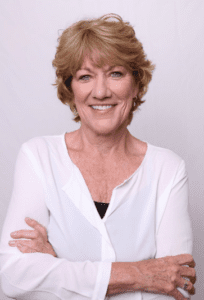
Nora Chahbazi, B.S.
Founder, EBLI Evidence-Based Literacy Instruction
Nora has dedicated over 25 years to improving reading instruction. She founded EBLI: Evidence-Based Literacy Instruction and has trained thousands of educators worldwide, teaching learners of all ages and abilities.
She has spoken at numerous conferences, including Plain Talk for Literacy and The Reading League. Nora collaborates with schools as well as organizations focused on implementing research-based teaching practices to promote high-level literacy for all.
Nora served as the literacy consultant for the documentary The Truth About Reading and participated in discussions after screenings, including at the SXSW film festival. She is on the board of The Reading League Michigan.
Nora has appeared in various media, including Emily Hanford’s Sold a Story podcast, the PBS documentary Building the Reading Brain, and an interview on Oprah Radio with Maya Angelou.
She is committed to the mission of teaching the world to read.

